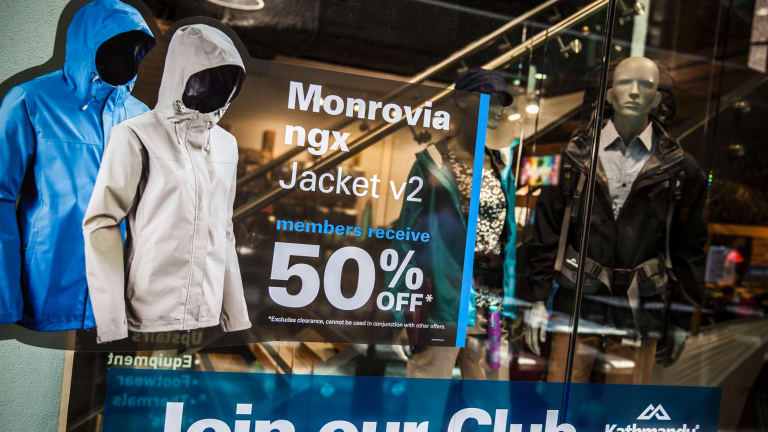DEXUS looks to sustainable industrial buildings to reduce costs
Large industrial tenants are moving away from sourcing their distribution centres through third party logistics companies and are instead investing in automation and sustainable building features, DEXUS executives say.
A string of recent lease renewals in DEXUS' Laverton North industrial estate, including beverages giant CUB, in Melbourne and the Quarry estate at Greystanes in Sydney, illustrated the trend, executives Mark Cuddy and Chris MacKenzie said.

Kathmandu has moved into a new sustainably-built distribution centre.Credit:Glenn Hunt
"We're finding with these bigger corporates, they're having less third party logistics operate their facilities. It's a trend we're seeing broadly across the market," said Mr MacKenzie, who heads up industrial development at the diversified property giant.
CUB recently renewed its lease on the Laverton estate for 45,493 square metres, a sizeable facility by any standard.
Other large tenants to also renew over the past four months include VISY Steel Industries (20,286 sq m) and Best Bar Reinforcements (13,008 sq m).
A new tenant, Unipod, has taken over 17,470 sq m vacated by logistics firm Fastline, said Mr Cuddy, the head of the industrial portfolio.
Camerons transport firm has renewed 10,850 sq m in Greystanes.
New leases in the facility included Toshiba Australia (12,520 sq m), building supplier Reece (20,690 sq m), Hello Fresh (9500 sq m) and AirRoad Logisitics (8680 sq m), he said.
Mr Cuddy said large firms, which had previously preferred to outsource their warehousing and distribution, were now bringing it in house.
"It's back to the future. Every single deal in Melbourne's west has been with the supplier or owner," he said.
All the lease renewals were near-term expiries, with CUB's a forward extension for a seven-year term from August 2017.
"In terms of beverage that's a long-term commitment," he said.
Outdoor gear provider Kathmandu has moved into a five-star purpose-built 25,000 sq m distribution facility in DEXUS' Laverton estate.
The group's arrival underpinned the estate's expansion into a further 49 hectares of master-planned land.
Kathmandu focused on ongoing building costs as well as its environmental impact so the facility has a five-star Green Star-certified building, photovoltaics, LED lights and control systems, water recycling and natural ventilation, Mr MacKenzie said.
"Tenants are much more aware of their operational costs not just the face rent," he said.
DEXUS was looking at building speculative space in Sydney and Melbourne to complement the pre-leases.
"We're probably almost back at levels we saw during the peak in 2007 in terms of activity. Definitely there's been heightened activity in terms of leasing," Mr MacKenzie said.
According to agency Knight Frank's latest industrial report, new stock supply in Melbourne slumped about 24 per cent below last year's levels.
Knight Frank analyst Kimberley Paterson said gross new industrial supply was expected to total 448,321 sq m this year, well below 2015, but forecasts suggest it would surpass the long-term average next year.
"Looking forward to 2017, with 174,494 sq m already under construction including Ego Pharmaceuticals and Target's precommitted facilities, supply levels are anticipated to be above the long-term average," Ms Paterson said.
Knight Frank's head of industrial Gab Pascuzzi said speculative construction levels remain 36 per cent below the long-term average and were forecast to account for only 22 per cent of total new supply delivered to Melbourne this year.
"Values continued to grow in the west, increasing by 20 per cent over the past 12 months underpinned by diminishing available industrial land. In contrast, values for small-sized lots eased in the northern region," he said.
Property Editor at The Age and BusinessDay journalist for Fairfax's theage.com.au, smh.com.au, watoday.com.au and brisbanetimes.com.au.
Most Viewed in Business
Please explain
Our weekly podcast giving you insight into the stories that drive the nation.
Listen now